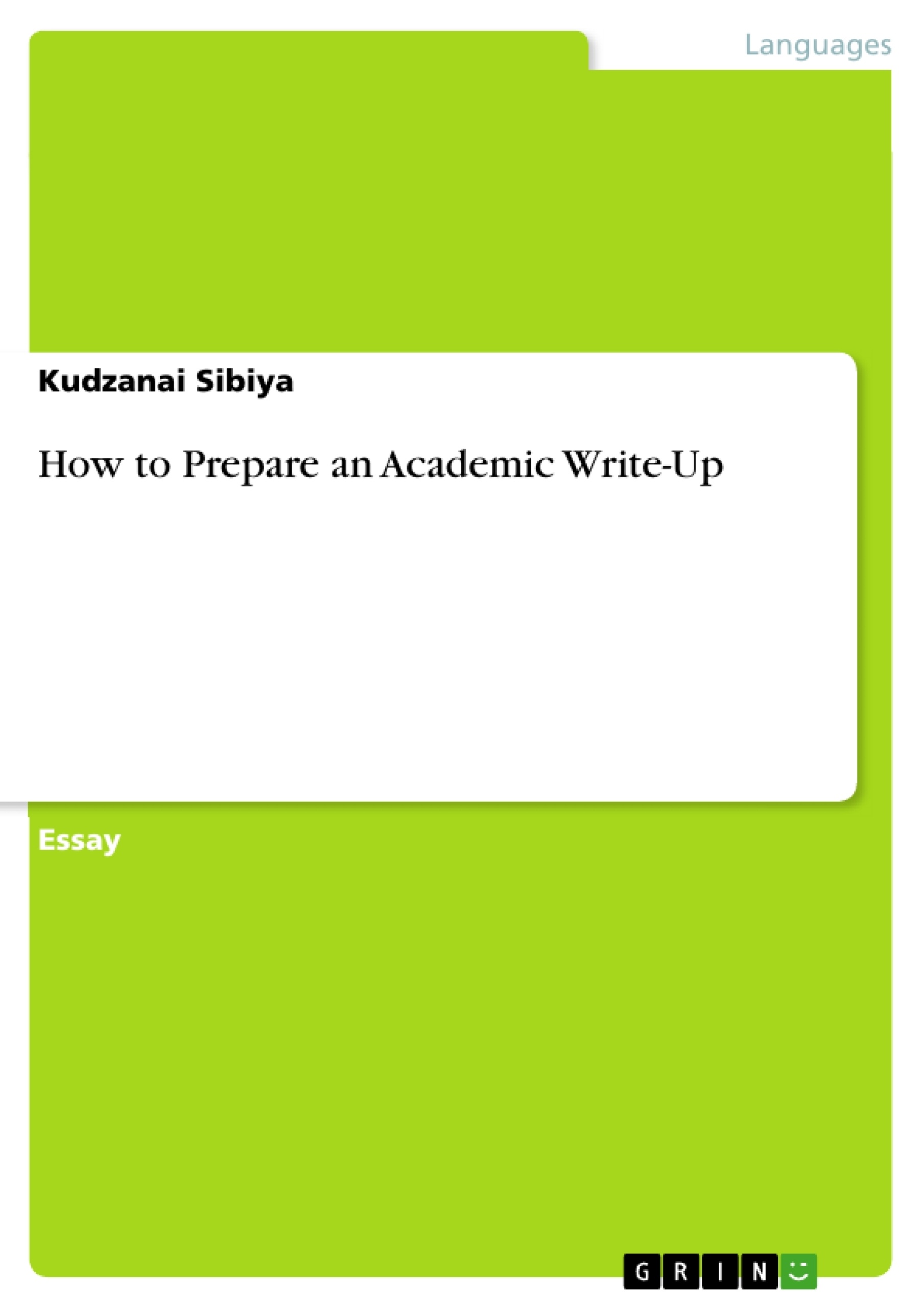The author of this write-up was motivated to come up with this paper after recognizing the challenges faced by students during their first time at a University or College. It is my hope that the readers will finds the contents of this write-up invaluable when writing academic papers. It will illustrate the steps that have to be taken — from finding a topic to completing the final draft.
Table of Contents
- 1. Introduction
- 1.1 Preparing an Academic Write-Up
- 1.2 Steps in Preparing an Academic Write-Up
- 1.2.1 Choosing the Topic
- 1.2.2 Analyzing the Topic or Question
- 1.2.3 Researching about the Topic
- 1.2.4 Preparing the Write-Up Plan
- 1.2.4.1 Stating the Topic Argument in One Sentence
- 1.2.4.2 Stating Key Points that Support the Argument
- 1.2.4.3 Stating One Key Point to Leave in the Readers' Minds
- 1.2.5 Preparing the First Draft of the Write-Up
- 1.2.6 Referencing the Write-Up
- 1.2.7 Completing the Final Draft
Objectives and Key Themes
The main objective of this text is to guide writers through the process of preparing an effective academic write-up. It aims to provide a structured approach, outlining key steps and considerations for producing a high-quality academic paper.
- The process of choosing and analyzing an academic topic.
- The importance of thorough research and note-taking in academic writing.
- Developing a write-up plan to organize ideas logically.
- The iterative nature of writing, including drafting, editing, and proofreading.
- The critical role of proper referencing to avoid plagiarism.
Chapter Summaries
1. Introduction: This introductory chapter sets the stage for the entire text by defining academic writing as a persuasive form of communication based on evidence and scholarly engagement. It distinguishes academic writing from personal narratives, emphasizing the writer's responsibility to present a well-supported argument based on academic sources. The chapter introduces the concept of a multi-step, non-linear process for producing academic work, foreshadowing the detailed steps explored in the following sections.
1.2 Steps in preparing academic write-up: This chapter details the crucial steps involved in creating an academic paper. It stresses that these steps are not necessarily linear, allowing for revisiting earlier stages as needed. It highlights the importance of choosing an engaging topic, thoroughly analyzing the topic or question to understand its requirements, and conducting comprehensive research using academic journals and textbooks. The chapter also emphasizes the role of note-taking, developing a write-up plan with a clear argument, and creating a draft that will eventually be refined through editing and proofreading. The process of referencing and avoiding plagiarism is touched upon as a crucial aspect of academic integrity.
Keywords
Academic writing, research, argumentation, planning, drafting, editing, proofreading, referencing, plagiarism, scholarly communication, evidence-based writing.
Frequently Asked Questions about "Preparing an Academic Write-Up"
What is the purpose of this text?
This text aims to guide writers through the process of preparing an effective academic write-up. It provides a structured approach, outlining key steps and considerations for producing a high-quality academic paper.
What are the key themes covered in this text?
The text covers choosing and analyzing an academic topic, thorough research and note-taking, developing a write-up plan, the iterative writing process (drafting, editing, proofreading), and the importance of proper referencing to avoid plagiarism.
What steps are involved in preparing an academic write-up according to this text?
The process involves choosing a topic, analyzing it, researching, preparing a write-up plan (including stating the argument, key supporting points, and a concluding point), drafting, referencing, and completing the final draft. The text emphasizes that these steps are not necessarily linear.
How does this text define academic writing?
Academic writing is defined as a persuasive form of communication based on evidence and scholarly engagement. It distinguishes itself from personal narratives by emphasizing the writer's responsibility to present a well-supported argument based on academic sources.
What is the importance of a write-up plan?
A write-up plan is crucial for organizing ideas logically. It helps to ensure a clear and coherent argument by outlining the main points and supporting evidence before beginning the drafting process.
Why is referencing important in academic writing?
Proper referencing is critical to avoid plagiarism and maintain academic integrity. It acknowledges the sources used in the research and supports the claims made in the paper.
What is the iterative nature of writing emphasized in the text?
The text highlights that writing is a non-linear process. It involves revisiting and refining earlier stages (such as researching or planning) as needed throughout the drafting, editing, and proofreading stages.
What are some key words associated with this text?
Key words include: Academic writing, research, argumentation, planning, drafting, editing, proofreading, referencing, plagiarism, scholarly communication, evidence-based writing.
What is covered in the introduction chapter?
The introduction defines academic writing, distinguishes it from other forms of writing, and introduces the multi-step, non-linear process of academic writing.
What is covered in the chapter on "Steps in preparing an academic write-up"?
This chapter details the crucial steps involved in creating an academic paper, emphasizing their non-linear nature. It highlights choosing a topic, analysis, research, note-taking, plan development, drafting, editing, proofreading, and referencing.
- Citar trabajo
- Kudzanai Sibiya (Autor), 2010, How to Prepare an Academic Write-Up, Múnich, GRIN Verlag, https://www.grin.com/document/298643



